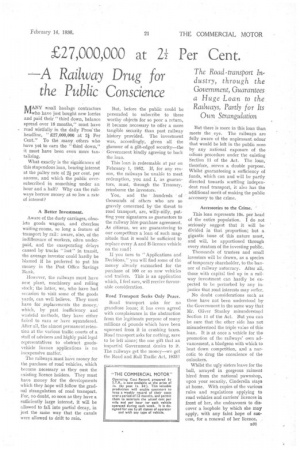27,000,000 at 2 Per Cent.
Page 41

If you've noticed an error in this article please click here to report it so we can fix it.
A Railway Drug for
the Public Conscience
The Road-transport Industry, through the Government, Guarantees a Huge Loan to the Railways, Partly for Its
Own Strangulation MANY small haulage contractors 41,2who have just bought new lorries and paid their "third down, balance spread over 18 months," must have read wistfully in the daily Pres&the headline, " t27,000,000 at 211. Per Cent." To the many others who have yet to earn the "third down," it must have been even more tantalizing.
What exactly is the significance of this stupendous loan, bearing interest at the paltry rate of 2i per cent. per annum, and which the public oversubscribed in something under an hour and a half? Why can the railways borrow money at so low a rate of interest?
A Better Investment.
Aware of the dusty carriages,-obsolete goods wagons, and cheerless waiting-rooms, so long a feature of transport by rail: aware, also, of the indifference of workers, often underpaid, and the exasperating delays caused by trucks " lost " in transit, the average investor could hardly be blamed if he preferred to put his money in the Post Office Savings Bank.
However, the railways must have new plant, machinery and rolling stock; the litter, we, who have had occasion to visit some of the goods yards, can well believe. They must have for .replacements the money,. which, by past inefficiency and wasteful methods, they have either failed to earn or have squandered. After all, the almost permanent retention at the various traffic courts of a staff of advisers and highly paid legal representatives to obstruct goodsvehicle licence applications is no inexpensive matter.
The railways must have money for the purchase of road vehicles, which become necessary as they oust the existing licence holders. They must have money for the developments which they hope will follow the gradual strangulation of road transport. For, no doubt, so soon as they have a sufficiently large interest, it will be allowed to fall into partial decay, in just the same way that the canals were allowed to drift to ruin. But, before the public could be persuaded to subscribe to these worthy objects for so poor a return, it became ,necessary to offer a more tangible security than past railway history provided. The investment was, accordingly, given all the glamour of a gilt-edged security—the Government kindly agreeing to back the .loan.
This loan is redeemable at par on February 1, 1952. If for ally reason, the railways be unable to meet redemption, you and 1, as guarantors, must, through the Treasury, reimburse the investors.
You, and the hundreds ' of thousands of others who are so gravely concerned by the threat to road transport, are, willy-nilly, putting your signatures as guarantors to the railway hire-purchase agreement. As citizens, we are guaranteeing to our competitors a loan of such magnitude that it would be sufficient to replace every A and B-licence vehicle on the Toad I
If you turn to "Applications and Decisions," you will find some of the money already earmarked for the purchase of 100 or so new vehicles and trailers. This is an application which, I feel sure, will receive favourable consideration.
Road Transport Seeks Only Peace.
Road transport asks for no grandiose loans; it has even agreed with complaisance in the abstraction from the legitimate purpose of many millions of pounds which have been squeezed from it in crushing taxes. Road transport asks for nothing, save to be left alone; the one gift that an impartial Government denies to it. The railways get the money—we get the Road and Rail Traffic Act, 19331 But there is more in this loan than meets the eye. The railways are fully aware of the unpleasant odour that would be left in the public nose by any national exposure of the odious procedure under the existing Section 11 of the Act. The loan, therefore, serves a double purpose. Whilst guaranteeing a sufficiency of funds, which can and will be partly directed towards scuttling independent road transport, it also has the additional merit of making the public accessory to the crime.
Accessories to the Crime. '
This loan represents 10s. per head of the entire population. I do not seriously suggest that it will be divided in that proportion; but a gigantic issue of this nature must, and will, be apportioned through every stratum of the investing public.
Thousands of trustees and small investors will be drawn, as a species of temporary shareholder, to the banner of railway autocracy. After all, those with capital tied up in a railway investment can hardly be expected to be perturbed by any injustice that road interests may suffer.
No doubt considerations such as these have not been understood by the Government in the same way that Mr. Oliver Stanley misunderstood Section 11 of the Act. But you can be sure that the other side has not misunderstood the triple value of this loan. It is at once a vehicle for the promotion of the railways' own advancement, a bludgeon with which to beat down competition, and a narcotic to drug the conscience of the onlookers.
Whilst the ugly sisters leave for the ball, arrayed in gorgeous raiment hired from the national pawnshop, upon your security, Cinderella stays at home. With copies of the various rules and regulations applying to road vehicles and carriers' licences in front of her, she endeavours to discover a loophole by which she may apply, with any faint hope of success, for a renewal of her licence.




















































































